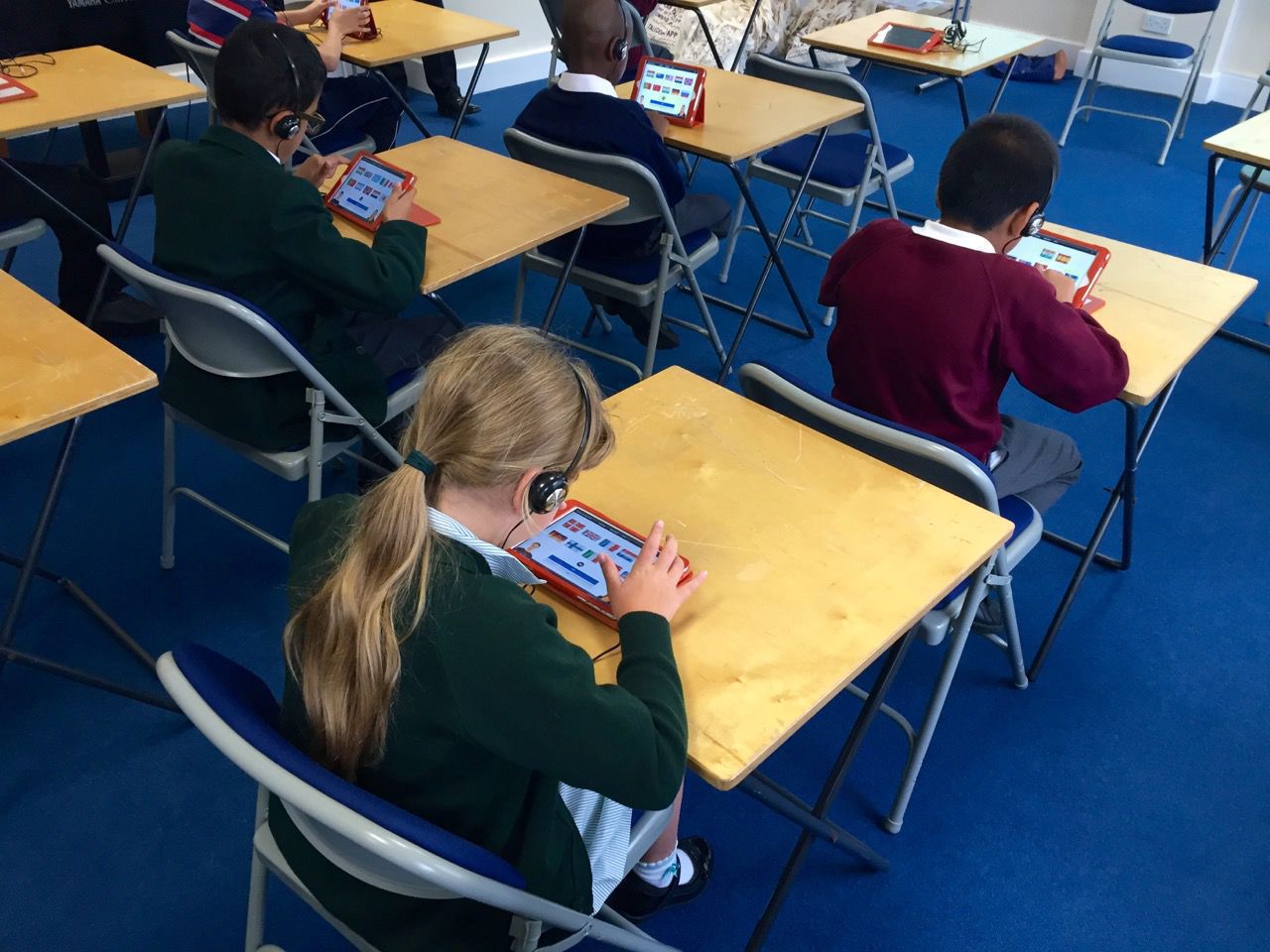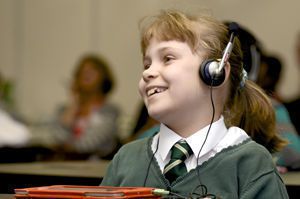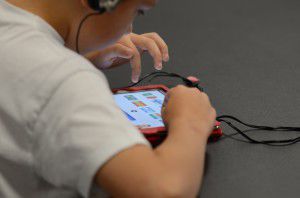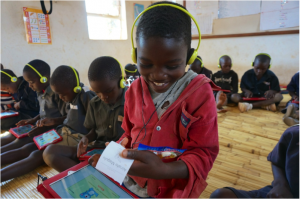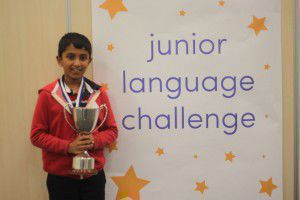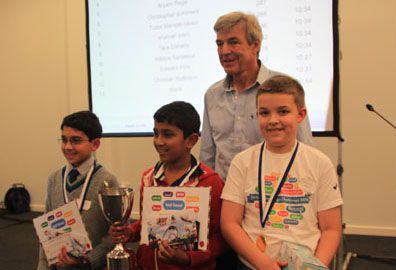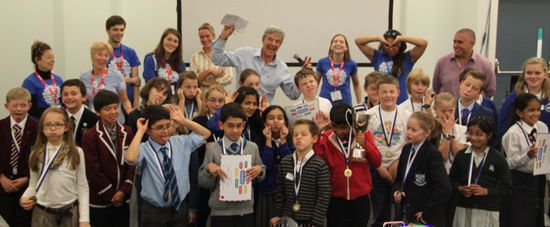Learn Chinese? No problem for our Junior Language Challenge semi-finalists!
As a EuroTalk newbie, I had no idea what to expect when it came to the Junior Language Challenge. I have heard a lot of stories (all good, I promise) over the last couple of months on what to expect at the semi-finals. We did a few practice rounds here at the EuroTalk office and I thought we had all done pretty well at getting the hang of Chinese, considering how hard the body game was! However, after the first round at my first semi-final, I realised that we were actually all pretty awful.
For those of you who are also new to the Junior Language Challenge, it is an annual competition for children who are under 11 years old. It runs from March until October, where the final is held at Language Show Live, London Olympia. Over this period, the children participating learn three languages. This year we chose Portuguese, Chinese and Arabic, three very different and difficult languages to learn. However, the children did not appear to struggle at all; the scores were amazing across all the semi-finals, with children regularly scoring top marks in the games.
There was a lovely atmosphere at the semi-finals I visited, and both hosting schools were fantastic at making everyone feel welcome (as well as providing us EuroTalkers with a fabulous lunch). The children, teachers and the parents were clearly buzzing with excitement and nerves. Every child put 100% effort into the games, even in the rounds which they made clear were not their favourites!
Even though it’s a competition, it was clear to see there were no hard feelings between the children. All were delighted to receive a goodie bag and a medal, and were eager to find out the final language. The whole thing was organised brilliantly by our marketing manager Liz, and couldn’t have happened without the support of all the schools, pupils, parents and teachers involved; so we thank you all for this! You have also helped us to raise nearly £6,000 for onebillion, who aim to bring education to some of the world’s poorest countries by developing apps. These apps are in the children’s native language and help them to learn maths, English and how to read. This money will help to continue onebillion’s amazing work in Malawi and change the lives of so many children.
The JLC is far from over yet! With the final less than 3 weeks away, on October 16th, the children now have the tough job of learning Arabic for their third language. The 33 finalists will go head to head at London Olympia, for the title of Junior Language Challenge champion 2015, in what promises to be a nail-biting competition. The winner will be going on a family holiday to Africa and we wish everyone taking part in the final the best of luck!
Are you coming to Language Show Live this year? If so, please do come up to seminar room 3 on Friday morning to watch the JLC final – everyone’s welcome!
Alex
Baby crying? Try sign language
I recently discovered something fascinating. Here it is: there is such a thing as Baby Sign Language. And it’s a pretty big deal.
 The idea behind it is very clever: by teaching simple signs to your baby from a really young age, they will be able to identify and sign everyday items, as well as being able to express simple desires and needs. There are signs for feelings such as ‘hungry’, ‘thirsty’, ‘thank you’, ‘want’, as well as objects such as ‘butterfly’, ‘chair’, ‘ant’, ‘uncle’.
The idea behind it is very clever: by teaching simple signs to your baby from a really young age, they will be able to identify and sign everyday items, as well as being able to express simple desires and needs. There are signs for feelings such as ‘hungry’, ‘thirsty’, ‘thank you’, ‘want’, as well as objects such as ‘butterfly’, ‘chair’, ‘ant’, ‘uncle’.
Because your baby can quite easily acquire new signs using their hands and arms ages before the muscles of their mouth have fully developed to allow comprehensive speech, the baby can communicate at a much younger age – and you, the parents, can communicate with them as well, not just interpreting what the baby says, but also responding through sign.
As well as supposedly creating a fuller relationship with the baby at a much younger age than if you wait for speech to develop, the advantage is that the baby will generally feel a lot happier because they’re able to express themselves. Crying babies are often upset because they can’t communicate their needs, or because those needs aren’t interpreted by the grown-ups in charge, but if the baby has a sure means of communicating to the parents then they’re less likely to feel frustrated and angry, and therefore less likely to cry (hallelujah, I hear people shout).
The way it works is that your baby will pick up on regularly repeated signs. It might take a little while before they can respond, or understand, but if you repeat the sign for an object or feeling every time your baby is around, then they will start to identify the sign as having a specific meaning.
As time goes on and they become more comfortable with the concept of signing, they will want to acquire more and more vocabulary – so make sure you keep up!
Here’s baby Fireese and her mum showing us how it’s done:
Has anyone ever taught their baby to sign? We’d love your comments!
Nat
5 reasons to join the Junior Language Challenge
If you’re a regular follower, you’ll have heard us talk in past years about the Junior Language Challenge, our annual competition for primary school children across the UK. This year’s challenge is now underway, and here’s why we want every child who’ll be aged 10 and under on 1st September 2015 to join in:
1. It makes languages fun
All parents and teachers know that children learn best when they’re enjoying themselves (as we all do – not just children!). So the JLC uses games and the competition element to make languages fun. We want every child who takes part in the JLC to come away from it with a new love of languages, and eager to continue with them as they move on to secondary school.
2. It introduces children to languages they’ve never heard of
Last year, children taking part in the competition learnt Italian, Japanese and Somali. This year, they’ll be starting with Portuguese. We like to offer exciting, different languages – because once a child knows they can learn Chichewa, suddenly French and Spanish won’t seem so daunting. And it encourages them to learn about other cultures and countries, some of which they may never have heard of before.
3. It doesn’t take up loads of teacher or parent time
We know teachers and parents are busy people. That’s why the JLC is designed to be as easy as possible to set up. We’ve even created this letter to parents, which explains what it’s all about. Everything’s done online, so once you’ve got them registered, children can login on any computer and keep learning. Our system records all the scores, so the only thing we need from the grown-ups once they’re up and running is encouragement!
4. It’s for charity
The JLC doesn’t just benefit the children who take part; it also raises money for our charity, onebillion. They’re doing fantastic work creating apps to transform the education of one billion children in developing countries, and we’re proud to support them. Each child who enters the competition pays a £5 entry fee, all of which is donated to the organisation.
5. There are some great prizes on offer
The JLC champion wins a once-in-a-lifetime family holiday to Africa (our 2013 winner, Ella, wrote us this fantastic report about her trip to Malawi). There are also prizes for the runners-up – in previous years these have included iPods and cameras – and goodie bags for everyone who makes it through to round 2 and beyond, including t-shirts, pens, and other treats, as well as discounts on EuroTalk software for the children and their schools.
Registration is open now for school groups and individuals. Teachers can register their school for free, to take a look and try out the games before deciding whether to sign up any pupils.
If you’d like more details about the Junior Language Challenge, or to join in, visit the website or email us.
And if you know anyone else who might be interested, please spread the word!
Good luck to everyone taking part this year. Or should we say Boa sorte 🙂
Quote of the week: 17 Jan 2015
“If you can’t explain it to a six year old, you don’t understand it yourself.” Albert Einstein
 For more like this, find us on Pinterest or We Heart It.
For more like this, find us on Pinterest or We Heart It.
Embed This Image On Your Site (copy code below):
Junior Language Challenge 2014 – the final!
On Friday 17th October, 31 young linguists from all over the country came to London for the final of our national competition for primary schools, the Junior Language Challenge. Since March, they’d learnt Italian for the first round, Japanese for the semi-finals and they’d spent the last few weeks studying the African language of Somali in preparation for the final.
As the final got underway, one thing became very clear – it was going to be close! We started with three tense heats, from which only the top 12 overall would gain a place in the final round. After a break for lunch (and a spot of African drumming to let out the tension), the top 12 returned to the iPads for the final showdown…
Congratulations to our champion, Yash Suribhatla, who put in an amazing performance to win the top prize of a family trip to Malawi. While he’s there, Yash will have the opportunity to see the work being done by our charity onebillion. Well done also to our runners-up, Nathan Govender from Surrey and Shane Bowden from London.
But we don’t want anyone to feel disappointed – with over 1,100 children registering for the JLC back in March, to reach the top 31 in the country is an absolutely amazing achievement and one we hope all our finalists will be very proud of. So we’d like also to say a huge congratulations to all our superstars, not only Yash, Nathan and Shane but also Christian, Nicole, Olivier, Edward, Christopher, Maciej, Rosie, Grace, Tara, Nithya, Aalaya, Matthew E, Isobel E, Matthew W, Tudor, Aryam, Georgia, Ben, Gregor, Cara, Eleanor, Isobel P, Jennifer, Sharvari, Harry, Saarah, Maryam and Theo!
See more photos from the JLC final.
And finally, a few words from our champion 🙂
Hello, my name is Yash Suribhatla and I attend Fairfield Preparatory School in Loughborough. I won the EuroTalk JLC final, 2014. This once in a life-time experience really interested me in learning new languages and I would describe it as one of the best learning opportunities I have ever had, which will remain with me for the rest of my life. I was glad to see all my hard work, trials and tribulations and occasional tears pay off in the very end. Realising that I had won was mind-blowing. What made it even more special was that I had never won such a big trophy in my life!
I felt so frightened as I entered my name at the start of the grand final. Going behind on points in the first three rounds, made me determined to fight back in the next few rounds. Luckily, I managed to pull it off and maintain my lead until the end. I was truly speechless when I won and managed to smile at my teacher, who smiled back in delight.
Well done, Yash!
If you’d like to know more about the Junior Language Challenge and how to take part in 2015, you can sign up to our mailing list on the JLC website, where there’s also more information on what the competition is all about. Or you can email us with any questions.
